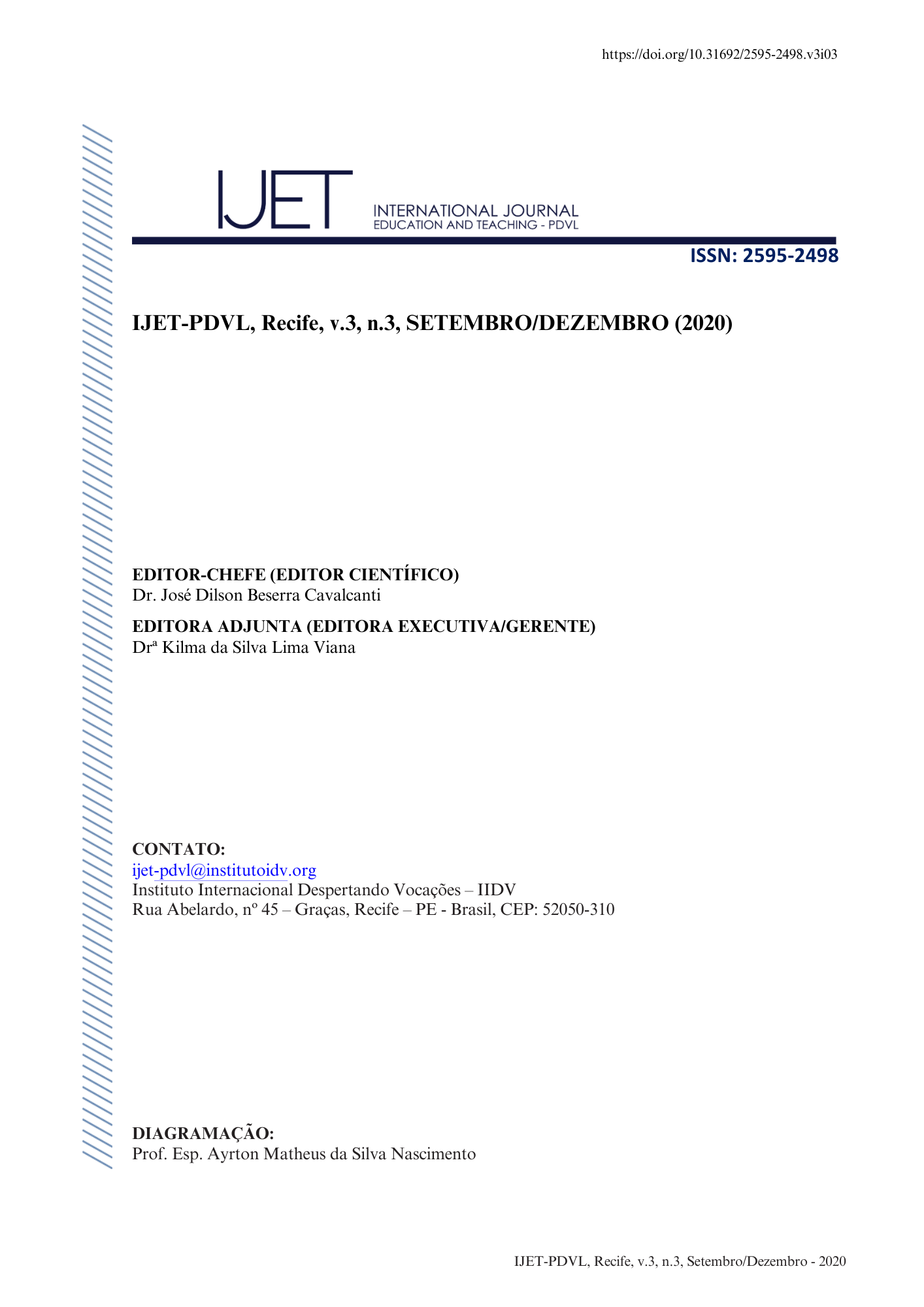PERCEPTIONS OF LICENSES IN BIOLOGICAL SCIENCES RELATED TO BIOCHEMICAL DISCIPLINE AND ITS TREATMENT IN BASIC AND UNIVERSITY EDUCATION
Abstract
The Biochemistry discipline, worked in Basic and Higher Education, accumulates a traditional character and of difficult assimilation by the students, mainly because it deals with structures invisible to the naked eye and often only imaginable, being important the students' perception for improvements in the quality of teaching-learning of that content. Thus, the present study aimed to report and discuss the perceptions of undergraduate Biological Sciences students from a Federal Institution of Higher Education related to the Biochemistry discipline, as well as their treatment in the classroom. For the respective participation, the students were informed of the research objectives and agreed to participate by completing a Free and Informed Consent Form (ICF). Subsequently, they answered a questionnaire containing 14 questions related to detailed aspects about their experiences throughout the discipline. In this sense, the results showed, in most cases, a negative evaluation of the methods used in the teaching of classes, not only in terms of difficulties in absorbing the proposed themes, but also in the way they were developed, thus pointing out a failure mainly in the choice of calls active methodologies for applying the content. In addition, a concern was observed among students regarding the best way to teach the Biochemistry discipline, through appropriate methodologies, since in the near future students will be in the position of teachers and will have to decide which methodologies to apply to allow effective learning to your students. Therefore, it is necessary to reflect on the search for a continuous improvement in the development of the proposed themes in a way that does not compromise the quality of the class, but that maintains the interest of the students throughout the course, through a balance between theory and practice. In this way, Biochemistry, as the basic discipline of undergraduate courses in Biological Sciences, can generate more complete graduates and future teachers committed to passing on its contents in a way that facilitates the teaching-learning process and an effective understanding of the topics studied.
Downloads
References
ANDRADE, R.S.B.; SILVA, A.F.S.; ZIERER, M.S. Avaliação das dificuldades de aprendizado em Bioquímica dos discentes da Universidade Federal do Piauí. Revista de Ensino de Bioquímica, vol 15, nº. 1, p.24-39, 2017.
BECKHAUSER, P. F.; ALMEIDA, E. M.; ZENI , A. L. B. O universo discente e o ensino de bioquímica. Revista de Ensino de Bioquímica, vol 4 , nº. 2, p.16-22, 2006.
BRASIL, Orientações Complementares aos Parâmetros Curriculares Nacionais (PCN+). Ciências da Natureza e Matemática e suas tecnologias. Brasília: MEC, 2006.
CHAER, G.; DINIZ, R. R. P.; RIBEIRO, E. A. A técnica do questionário na pesquisa educacional. Revista Evidência, vol. 7, nº. 7, p.251-266, 2011.
DIAS, G.; et al. Desenvolvimento de Ferramentas Multimidiáticas para o Ensino de Bioquímica. Revista PRÁXIS, vol 5, nº. 9, p.25-30, 2013.
FRAGELLI, R. R. Trezentos: Aprendizagem Ativa e Colaborativa como uma Alternativa ao Problema de Ansiedade em Provas. Revista Eletrônica Gestão e Saúde, vol 6, nº. 9, p. 860-872, 2015.
JÚNIOR, W. E. F. Bioquímica no ensino médio?! (de)limitações a partir da análise de alguns livros didáticos de química. Ciência e Ensino, vol 1, nº. 2, 2007.
MATTA, L. D. M.; NETO, L. S. Propostas de Projetos Voltados para o Ensino Básico, Desenvolvidos por Estudantes de Licenciatura. Ensino de Bioquímica e Formação de Docente, vol 38, nº. 3, p.224-229, 2016.
MONTEIRO B. S.; et al. Metodologia de desenvolvimento de objetos de aprendizagem com foco na aprendizagem significativa. Simpósio Brasileiro de Informática na Educação, vol 17, p. 388-397, 2006.
NELSON, D. L.; COX, M. M. Lehninger – Princípios de Bioquímica. 6ed. São Paulo: Sarvier, 2014.
NOGARA, P. A.; et al. Percepção de estudantes de graduação de uma Universidade brasileira sobre a disciplina de Bioquímica. Revista de ensino de Bioquímica, vol 16, nº 1, p. 5-24, 2018.
PERSON, V. A; ROCHA, J. B. T. Inter-relação entre metodologias didáticas, motivos e aprendizagem em Bioquímica. Revista Insignare Scientia, vol. 3, nº. 2 , p.101-108, 2020.
PINHEIRO, T. D. L.; et al. Ensino de Bioquímica para acadêmicos de Fisioterapia: visão e avaliação do discente. Revista de Ensino de Bioquímica, vol 7 , nº. 1, p.25-35, 2009.
PORTUGAL, L. R.; OLIVEIRA, G. O. Método Trezentos como Estratégia de Ensino-aprendizagem na Disciplina de Bioquímica do Curso de Educação Física. Congresso de Inovação e Metodologias no Ensino Superior, nº 4, 2019.
SCATIGNOL, A. C.; TORRES, B. B. Diagnósticos e intervenções no Ensino de Bioquímica. Journal of Biochemistry Education, vol 24, nº.1, p. 29-51, 2016.
SCHIMIDT, D. B.; et al. Mapas Conceituais no Ensino da Bioquímica, uma Integração entre os Conceitos Científicos. Revista de Ensino de Bioquímica, vol 12, nº. 2, p. 7-23, 2014.
SCHONBORN, K. J.; ANDERSON, T. R. The importance of Visual Literacy in the Education of Biochemists. Biochemestry and Molecular Biology Education, vol 34, nº. 2, p. 94-102, 2006.
SOUZA, K. M. S.; et al. Elaboração de modelos moleculares reutilizando materiais para o ensino da Bioquímica. Cadernos de Educação Básica, vol 5, nº. 2, p. 1-17, 2020.
ZENI, A. L. B. Conhecimento prévio para a disciplina de Bioquímica em cursos da área da saúde da Universidade Regional de Blumenau-SC. Revista Brasileira de Ensino de Bioquímica e Biologia Celular, vol 1, nº. 1, p. B1-B13, 2010.

Downloads
Published
Conference Proceedings Volume
Section
License
Copyright (c) 2020 JOSÉ SÉRGIO HERCULANO GOMES DA SILVA, ANDRESSA RAQUEL MACIEL BARROS PONTES, MARIA CLARA DE SOUZA, VICTOR MANOEL GONÇALVES DOS SANTOS, YASMIM ALLINE DE ARAÚJO CASTRO (Autor)

This work is licensed under a Creative Commons Attribution 4.0 International License.





